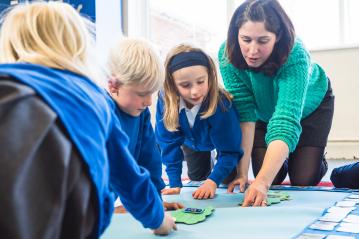Enhancing Literacy Teaching: The Power of Poetry
Incorporating poetry into literacy teaching can have a profound impact on pupils' language skills and creative thinking. Poetry offers a unique opportunity to explore the power of language and cultivate a deeper understanding and appreciation for its nuances. In this blog, we will explore the benefits of incorporating poetry into literacy teaching and provide practical ways to integrate it into the curriculum.
Benefits of Incorporating Poetry into Literacy Teaching
 1. Enhancing Language Skills: Poetry exposes pupils to rich vocabulary, figurative language, and different writing styles. Analysing and interpreting poems helps pupils develop their reading comprehension and critical thinking skills.
1. Enhancing Language Skills: Poetry exposes pupils to rich vocabulary, figurative language, and different writing styles. Analysing and interpreting poems helps pupils develop their reading comprehension and critical thinking skills.
2. Fostering Creativity: Poetry encourages pupils to think imaginatively and express themselves through words. Writing their own poems allows them to experiment with language and explore their unique perspectives.
3. Promoting Self-Expression: Poetry provides a platform for pupils to share their thoughts, emotions, and experiences. It allows them to find their voice and build confidence in their ability to communicate effectively.
Practical Ways to Incorporate Poetry into the Curriculum
1. Reading and Analysing Poems: Select a variety of poems that align with your curriculum objectives. Engage pupils in discussions about the themes, imagery, and language used in the poems. Encourage them to share their interpretations and connect the poems to their own experiences.
Reading and Analysing Poems: Select a variety of poems that align with your curriculum objectives. Engage pupils in discussions about the themes, imagery, and language used in the poems. Encourage them to share their interpretations and connect the poems to their own experiences.
2. Writing Poetry: Provide opportunities for pupils to write their own poems. Offer writing prompts, such as using a specific poetic form or exploring a particular theme. Encourage creativity and provide feedback to help pupils develop their writing skills.
3. Performing Poetry: Create a supportive environment where pupils can perform their poems. This can be done individually or in groups. Performing poetry helps pupils build confidence in public speaking and allows them to share their work with their peers.
The Impact of Poetry on Pupils' Literacy Development
1. Improved Fluency: Reading and reciting poetry helps pupils develop their oral fluency. The rhythmic and melodic nature of poetry enhances their ability to pronounce words accurately and read with expression.
2. Increased Confidence: Engaging with poetry gives pupils a sense of accomplishment and boosts their confidence in their reading and writing abilities. Success in understanding and analysing poems motivates pupils to tackle more challenging texts.
3. Love for Reading and Writing: Exposing pupils to the beauty and power of poetry can ignite a passion for reading and writing. Poetry's creative and personal nature can make literacy lessons more engaging and enjoyable for pupils.
Creating a Positive and Inclusive Learning Environment with Poetry
 1. Cultural Exploration: Introduce pupils to poetry from different cultures and time periods. This allows them to gain a broader perspective and appreciate the diversity of human experiences.
1. Cultural Exploration: Introduce pupils to poetry from different cultures and time periods. This allows them to gain a broader perspective and appreciate the diversity of human experiences.
2. Fostering Imagination: Poetry encourages pupils to think outside the box and explore alternative ways of viewing the world. It stimulates their imagination and nurtures their creativity.
3. Promoting Empathy: Poems often evoke emotions and spark empathy in readers. By reading and discussing poems that address universal themes and experiences, pupils develop empathy and understanding for others.
Conclusion
Incorporating poetry into literacy teaching offers numerous benefits for pupils. It enhances their language skills, fosters their creativity, and promotes self-expression. By providing practical ways to incorporate poetry into the curriculum, teachers can improve pupils' fluency, boost their confidence, and foster a love for reading and writing. Furthermore, poetry creates a positive and inclusive learning environment, allowing pupils to explore different cultures, perspectives, and emotions. So, why not embrace the power of poetry and transform your literacy instruction?
